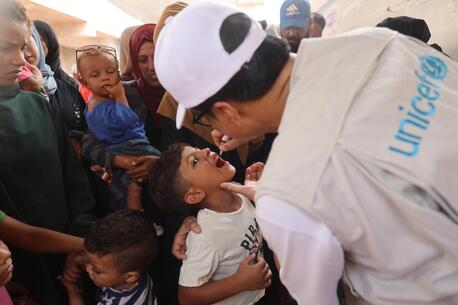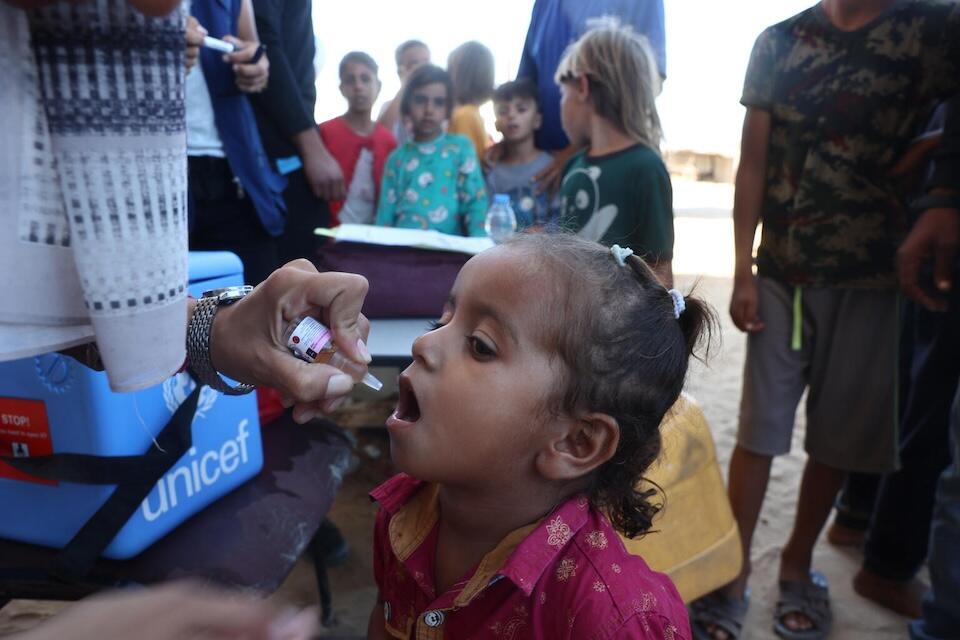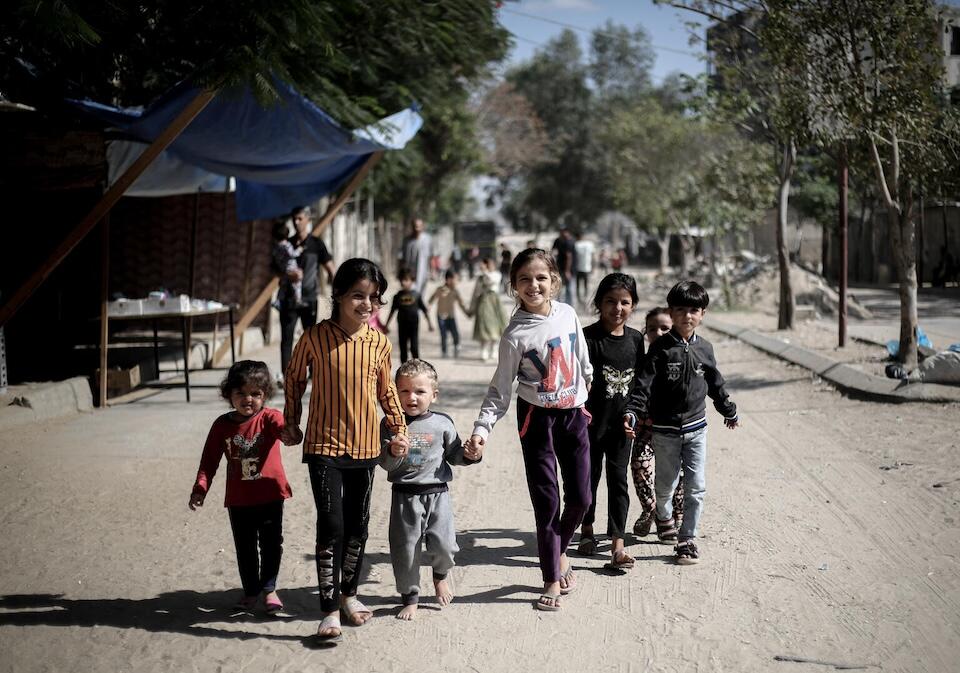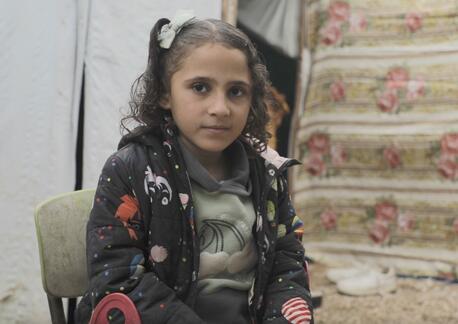
After Early Success, Gaza Polio Vaccination Campaign Needs Humanitarian Pause to Continue
The initial rounds of an ambitious campaign to protect children from polio in the Gaza Strip hit their target, but escalating violence is undermining that progress. UNICEF and partners renew their call for an immediate ceasefire.
A humanitarian pause made the first phases of Gaza's polio vaccination campaign possible
Once the world's leading cause of paralysis, polio is a deadly viral disease with no cure, only prevention. Children in conflict zones like the Gaza Strip, living in crowded conditions without adequate water, sanitation or health care, are particularly at risk.
When the highly infectious poliovirus was discovered in Gaza's sewage water in July 2024, it was just a matter of time before several cases of paralysis from polio were confirmed — the first in the Gaza Strip in 25 years.
To stop the outbreak from spreading and protect children already weakened after nearly a year of bombardment, displacement and severe supply shortages, UNICEF worked with partners to organize an emergency polio vaccination campaign.

By late August, UNICEF had successfully rushed 1.2 million doses of novel oral polio vaccine type 2 (nOPV2) to the Gaza Strip. Mobile and transit teams began vaccinating children under 10 on Sept. 1. Around 560,000 children were vaccinated during a 12-day campaign that wouldn't have been possible without a coordinated humanitarian pause in the fighting.
“Preparing for this ambitious campaign and securing these pauses was not easy but it demonstrates that it is possible to allow supplies into the Strip, silence the strikes and protect civilians," said Adele Khodr, UNICEF Regional Director for the Middle East and North Africa. "There just has to be the will."
Preparing for this ambitious campaign and securing these pauses was not easy but it demonstrates that it is possible to allow supplies into the Strip, silence the strikes and protect civiliians. There just has to be the will. — Adele Khodr, UNICEF Regional Director for the Middle East and North Africa
Since the start of Round Two of Gaza's polio campaign on Oct. 14, nearly 443,000 children under 10 have been vaccinated against polio in central and southern Gaza, roughly 94 percent of the target in those areas. Almost 358,000 children received immune-boosting Vitamin A supplements, part of an effort to integrate the delivery of the polio vaccine with other health services in Gaza.
Vitamin A will protect "maybe 15 percent to 25 percent [of children] from dying of various diseases that they may otherwise be susceptible to," Melanie Galvin, Chief of Health and Nutrition for UNICEF in the State of Palestine, said on Oct. 15. "We expect great results. And we're very pleased so far with the number of parents coming. It's really a triumph of hope for the future of their children that they're bringing them here to be vaccinated."
Watch the video:
Current conditions in northern Gaza make it impossible for families to safely bring their children for vaccination and for health workers to operate
Fast forward to Oct. 23, the day UNICEF and the World Health Organization announced that the final phase of the vaccination campaign — aiming to reach more than 119,000 children across northern Gaza with a second dose of the polio vaccine — has been postponed due to escalating violence, intense bombardment, mass displacement orders and a lack of assured humanitarian pauses.
Current conditions, including ongoing attacks on civilian infrastructure, continue to jeopardize people’s safety and movement in northern Gaza, making it impossible for families to safely bring their children for vaccination, and for health workers to operate.
We now face the risk of the spread of the poliovirus in the Gaza Strip and neighboring countries, and of more children being paralyzed. — James Elder, UNICEF spokesperson
A delay in administering a second dose of nOPV2 within six weeks reduces the impact of two closely spaced rounds on concurrently boosting the immunity of all children and stopping the virus from spreading.
"Having a significant number of children miss out on their second vaccine doses will seriously jeopardize efforts to stop the transmission of the poliovirus in Gaza," UNICEF Spokesperson James Elder warned. "We now face the risk of the spread of poliovirus in the Gaza Strip and neighboring countries, and of more children being paralyzed."

Until every child is protected from polio, all children are at risk
To interrupt poliovirus transmission, at least 90 percent of all children in every community and neighborhood must be vaccinated – a prerequisite for an effective campaign to stem the outbreak.
Polio's reappearance anywhere is a stark reminder that until all forms of polio are gone, children in every country remain at risk.
UNICEF and the WHO are urging all parties to ensure that civilians, health workers and civilian infrastructure, such as schools, shelters, and hospitals, are protected and renew their call for an immediate ceasefire to safeguard children's lives and allow Gaza's vaccination campaign to proceed.
"It may take a little longer than we planned, but we'll definitely get it done," said Hamish Young, UNICEF Senior Emergency Coordinator, speaking from Al Mawasi in the southern Gaza Strip on Oct. 24.
UNICEF helps vaccinate over 400 million children globally against polio every year and manages the procurement and distribution of over 1 billion doses of polio vaccines annually, accounting for more than 50 percent of global oral polio vaccines. Your contribution can make a difference. Please donate today.
HOW TO HELP
There are many ways to make a difference
War, famine, poverty, natural disasters — threats to the world's children keep coming. But UNICEF won't stop working to keep children healthy and safe.
UNICEF works in over 190 countries and territories — more places than any other children's organization. UNICEF has the world's largest humanitarian warehouse and, when disaster strikes, can get supplies almost anywhere within 72 hours. Constantly innovating, always advocating for a better world for children, UNICEF works to ensure that every child can grow up healthy, educated, protected and respected.
Would you like to help give all children the opportunity to reach their full potential? There are many ways to get involved.





